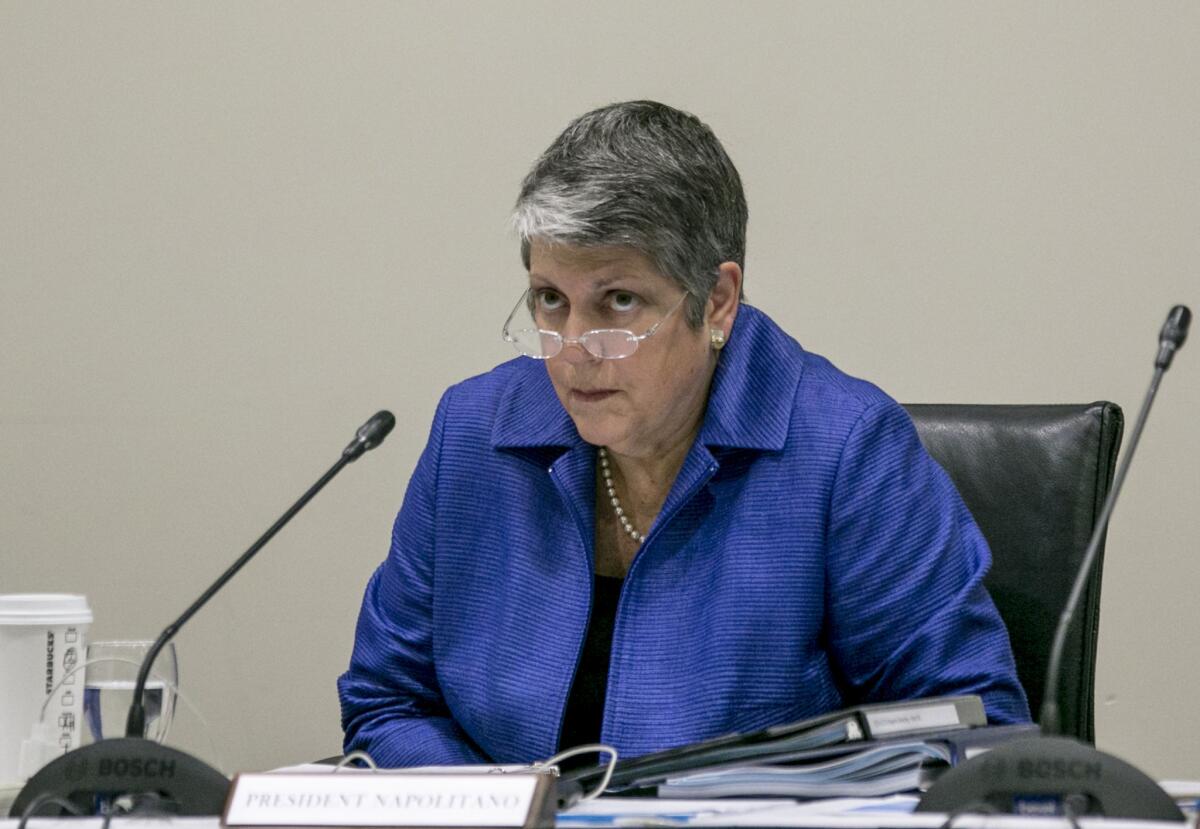Opinion: Opinions can be as hurtful as slurs and insults, but they should be protected

University of California President Janet Napolitano addresses a Board of Regents meeting at the UC Irvine Student Center to discuss a controversial policy statement on intolerance on Sept. 17.
- Share via
Last week the University of California Board of Regents kicked the can down the road on an issue that blends ethnic and religious identity, foreign policy and -- last and unfortunately least in some minds -- the 1st Amendment.
The regents reacted unenthusiastically to a “Statement of Principles Against Intolerance” drafted by the staff of UC President Janet Napolitano, a document that alarmed free-speech advocates and disappointed some advocates for Jewish students.
The latter group wants an intolerance policy that would endorse a State Department definition that says it’s anti-Semitic to subject Israel to “double standards by requiring of it a behavior not expected or demanded of any other democratic nation” or to deny Israel “the right to exist.” (A witness at last week’s meeting suggested that speech “de-legitimizing” Israel also crosses the line.) Some Jewish students at UC believe pro-Palestinian activism on campus has created a hostile environment for them.
As my colleague Larry Gordon reported, the regents withdrew the controversial policy statement and launched a new effort to rewrite it over the next few months.
The Times has editorialized against a UC endorsement of the State Department document, arguing that it could chill protected political speech. But we also had problems with the more general “Statement of Principles Against Intolerance.” We argued that the policy didn’t draw a clear enough distinction between acts of intolerance and the expression of opinions that might offend or even enrage some students.
That distinction is crucial. A student who calls a classmates a “Zionist ____” (fill in the anti-Jewish slur) or hangs a noose in a black student’s room is engaging in intimidating behavior and should be punished. Threats long have been considered outside the protection of the 1st Amendment.
The problem with the now-shelved statement of principles was that it also might also apply to a speech or email or op-ed in the student newspaper that someone might consider racist or (if it denounced Israel) anti-Semitic.
Still, free-speech advocates like me need to acknowledge that it isn’t just insults and hate speech that hurt people’s feelings or threaten their sense of self. So do opinions.
A Jewish student at UC who closely identifies with the State of Israel is going to feel wounded by a speaker or a demonstration that accuses Israel of oppressing Palestinians -- even if it is free of Nazi imagery or anti-Semitic slurs. A devoutly Catholic student’s day will be ruined if he walks by a protest sign accusing the church of shielding pedophiles or condemning Africa to poverty because it opposes birth control.
The Argus, the student newspaper at Wesleyan University in Connecticut, is currently the target of student protests because it published an op-ed column daring to criticize the Black Lives Matter movement.
A petition calling for boycotting and defunding the paper contains this complaint: “The undersigned agree to boycott the Argus, recognizing that the paper has historically failed to be an inclusive representation of the voices of the student body. Most specifically, it neglects to provide a safe space for the voices of students of color and we are doubtful that it will in the future.” (By “safe space,” the petitioners apparently have in mind a newspaper that doesn’t contain any opinion they find offensive.)
As Justice Oliver Wendell Holmes once wrote, every idea is an incitement. An open-eyed defense of free speech, in society at large or on a university campus, will recognize that words and ideas can hurt even though they don’t break any bones and even if they don’t constitute threats. But we protect them anyway.
Responding to the controversy on his campus, Wesleyan University President Michael Roth said: “Debates can raise intense emotions, but that doesn’t mean that we should demand ideological conformity because people are made uncomfortable. As members of a university community, we always have the right to respond with our own opinions, but there is no right not to be offended.”
Maybe UC’s regents should incorporate those words in their final statement on intolerance.
Follow Michael McGough on Twitter @MichaelMcGough3
More to Read
A cure for the common opinion
Get thought-provoking perspectives with our weekly newsletter.
You may occasionally receive promotional content from the Los Angeles Times.










